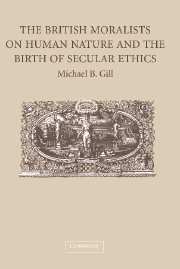Book contents
- Frontmatter
- Contents
- Introduction
- PART ONE WHICHCOTE AND CUDWORTH
- 1 The Negative Answer of English Calvinism
- 2 Whichcote and Cudworth's Positive Answer
- 3 Whichcote and Cudworth on Religious Liberty
- 4 Rationalism, Sentimentalism, and Ralph Cudworth
- 5 The Emergence of Non-Christian Ethics
- PART TWO SHAFTESBURY
- PART THREE HUTCHESON
- PART FOUR DAVID HUME
- Notes
- Bibliography
- Index
4 - Rationalism, Sentimentalism, and Ralph Cudworth
Published online by Cambridge University Press: 29 July 2009
- Frontmatter
- Contents
- Introduction
- PART ONE WHICHCOTE AND CUDWORTH
- 1 The Negative Answer of English Calvinism
- 2 Whichcote and Cudworth's Positive Answer
- 3 Whichcote and Cudworth on Religious Liberty
- 4 Rationalism, Sentimentalism, and Ralph Cudworth
- 5 The Emergence of Non-Christian Ethics
- PART TWO SHAFTESBURY
- PART THREE HUTCHESON
- PART FOUR DAVID HUME
- Notes
- Bibliography
- Index
Summary
Whichcote and Cudworth's role in the development of religious liberty was pivotal to Enlightenment thought. But Cudworth (and, to a lesser extent, Whichcote) was instrumental to the development of another highly influential line of thought as well: moral rationalism.
Moral rationalism is the view that morality originates in reason alone. It is often contrasted with moral sentimentalism, which is the view that the origin of morality lies at least partly in (non-rational) sentiment. The eighteenth century saw pitched philosophical battles between rationalists and sentimentalists, and the issue continues to fuel debates among philosophers today.
The eighteenth-century rationalists took Cudworth to be one of their champions and the sentimentalists of the period agreed, placing Cudworth squarely in the opposing camp (see Price 20 and Hume's Second Enquiry 93). This view of Cudworth was further solidified in 1897, when Selby-Bigge published an influential two-volume collection of the writings of the British moralists. In his preface, Selby-Bigge explained that the first volume contained the writings of moral sentimentalists and the second volume the writings of moral rationalists. Cudworth appeared in the second – the rationalist – volume (see Selby-Bigge 1897/1964, xxxii). Since many twentieth-century philosophers knew Cudworth and numerous other British moralists primarily through Selby-Bigge's collection, it is understandable that they came to think both that the most important distinction in early modern British moral philosophy was between rationalism and sentimentalism and that Cudworth was one of the rationalists.
- Type
- Chapter
- Information
- Publisher: Cambridge University PressPrint publication year: 2006
- 1
- Cited by



